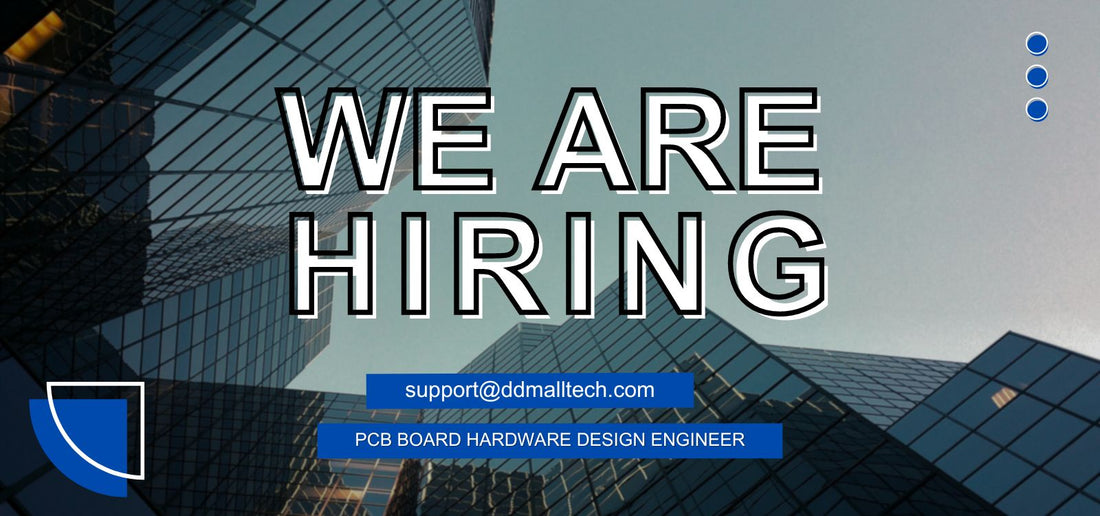
PCB Hardware Electronic Engineer Wanted
Share
As a video technology company that connects hardware with manufacturers, DDMALL relies on cutting-edge PCB board designs and technologies to deliver high-quality prototypes and small-run production to our customers.
At DDMALL, one of the most important roles we seek to fill through our ongoing recruitment efforts is that of a PCB board hardware design engineer. These specialists play a significant part in bringing our electronic product ideas to life through the actual design and development of printed circuit board assemblies.
Table of Contents:
- What Exactly Does a PCB Board Hardware Design Engineer Do?
- Required Skill Sets for PCB Board Hardware Design Engineer
- The Rewards of Joining Our Talented Team
- Exciting Career Prospects in a Growing Industry
- The Crucial Role of PCB Board Hardware Design Engineers in Our Recruitment Process
- Importance of PCB Design Expertise to DDMALL's Success
Their skills and expertise are crucial for transforming conceptual designs into functional hardware and meeting our engineering demands. This makes attracting top PCB engineering talent a high priority in our recruiting initiatives.
What Exactly Does a PCB Board Hardware Design Engineer Do?
A PCB board hardware design engineer is responsible for conceptualizing and realizing the physical layout of circuit boards that will be incorporated into electronic devices and systems. Some of the key duties involved in this role include:
Interpreting schematic diagrams and engineers' design specifications to understand circuit requirements and functionality.
- Creating mechanical drawings and layouts of circuit traces, mounted components, and connector placements using specialized EDA (electronic design automation) software tools.
- Carefully routing traces between components on multiple board layers while adhering to strict design rules for electrical performance and manufacturability.
- Selecting appropriate component types and considering factors like voltage ratings, current carrying capacities, and footprint sizes.
- Checking for design flaws using simulation and DRC (design rule checking) tools to validate manufacturability and prevent errors.
- Coordinating with other teams on connections to other circuit boards and overall system integration needs.
- Producing fabrication outputs in industry-standard formats for manufacturing.
- Debugging prototypes and assisting in bringing products to volume production.
The scope of work involves both frontend design activities as well as backend troubleshooting and refinement roles requiring strong technical skills and attention to detail.
Required Skill Sets
Being a PCB hardware design engineer requires expertise in several technical domains. Some of the core skills and qualifications we look for include:
- A bachelor's degree in electrical engineering or a related technical field of study. An advanced degree is considered a plus.
- 3-5 years of hands-on experience with PCB design tools like Altium Designer, Cadence Allegro, or Mentor Graphics PADS.
- Extensive knowledge of printed circuit board fabrication processes, design rules, and manufacturing constraints.
- Expertise in schematic capture, component selection, circuit layout/routing, and design rule checking methodologies.
- Familiarity with industrial standards like IPC, JEDEC, and component datasheet specifications.
- Ability to read and interpret schematic diagrams, block diagrams, assembly drawings, and design documentation.
- Troubleshooting skills to debug design issues and optimize circuit performance.
- Strong communication and coordination abilities for interacting with cross-functional teams.
- Attention to detail and quality control mindset for adhering to manufacturing and compliance requirements.
- Self-motivation and time management skills for working independently on multiple concurrent projects.
Given the technical complexity involved, we seek candidates that have a proven track record of translating product requirements into functional and manufacturable circuit designs on time and on budget.
The Rewards of Joining Our Talented Team
As you can imagine, finding engineers who possess these diverse qualifications doesn't happen every day. That's why we're willing to offer highly competitive compensation packages to attract top board design talent.
Some of the great perks of joining DDMALL include:
- Competitive salary plus annual bonuses
- Medical, dental, and vision insurance benefits
- Generous paid time off including holidays
- Stock options and profit-sharing programs
- Ongoing training/education stipends and certifications reimbursements
- Ergonomic workstations with the latest design/QA software and hardware tools
- Exciting growth opportunities as our business expands globally
- The chance to work on innovative projects that make a real-world impact
- A relaxed yet focused company culture centered around quality, creativity and customer passion
If tackling complex PCB design challenges while delivering best-in-class prototyping support to entrepreneurs sounds exciting, I encourage you to explore our open opportunities.
The work is hands-on, fast-paced and never boring. You'll be joining a talented team that's passionate about moving hardware from visions to realities.
Exciting Career Prospects in a Growing Industry
Working as a PCB hardware design engineer at DDMALL provides exciting career opportunities in the booming consumer electronics sector. As an innovative supplier with a wide range of products, there are plenty of challenging engineering projects to work on.
Engineers in this role can take on responsibilities of increasing scope and leadership over time. Senior PCB designers may manage teams and act as the technical lead for complex projects. Architect-level positions involve core algorithm and systems design work as well. Research and development duties are available to contribute new and enhanced product ideas from concept to production. There are also openings related to international regulations and certification standards compliance.
Overall, a career as a PCB hardware design engineer at DDMALL promises dynamic technical challenges, developmental scope, competitive rewards, and the satisfaction of designing consumer products that improve lives. It is undoubtedly one of the most stimulating and in-demand roles we seek to fill through our active recruitment efforts.
The Crucial Role of PCB Board Hardware Design Engineers in Our Recruitment Process
At DDMALL, having the right talent who are passionate about our vision and committed to our core values is just as important as their technical skills. As an engineer-driven company, we aim to bring high-quality prototyping solutions and technologies to hardware startups around the world.
Work-life balance and wellbeing are also top priorities aligned with our values. Engineers will be provided flexibility, learning opportunities, and an enjoyable company culture focused on positivity, care for one another and doing meaningful work together.
If driven to use your expertise for good, to nurture creativity worldwide, and help hardware dreams take flight, then our vision should resonate. We hope to find like-minded engineers passionate about enabling innovation through open collaboration at all levels. With shared goals, our team will continue to revolutionize how hardware startups get prototypes made.
Importance of PCB Design Expertise to DDMALL's Success
In summary, PCB board hardware design engineers are absolutely crucial to DDMALL's mission of delivering innovative and high-quality electronic devices. Their skills directly enable our ability to transform conceptual ideas efficiently into manufacturable products through excellence in circuit board design and development.
We depend on top PCB design talent to ensure our circuits, prototypes and volume production runs meet demanding quality standards and live up to customers' expectations.
Their detailed work significantly influences important business metrics like project timelines, production yields and overall costs.
By attracting and retaining the industry's best hardware engineers, DDMALL aims to establish a continuous competitive advantage through cutting-edge product designs, rapid time to market, and optimal supply chain efficiency.
Their contributions are pivotal for the company's success and further growth opportunities in global consumer technology markets.
The important role PCB board hardware design engineers play in DDMALL's recruiting efforts and organizational goals:
- Collaborating with cross-functional teams:
- Work closely with product managers, electrical engineers, and mechanical engineers.
- Understand product requirements and design constraints.
- Enables a holistic approach to product development and enhances functionality and performance.
- Designing and optimizing PCB layouts:
- Primary responsibility is to create PCB layouts that meet electrical and mechanical requirements.
- Carefully consider factors like signal integrity, power distribution, thermal management, and manufacturability.
- Optimize layout to minimize noise, reduce power consumption, and improve reliability.
- Conducting thorough design reviews:
- Conduct comprehensive design reviews to identify potential issues and ensure compliance with standards.
- Identify design flaws and minimize the risk of errors.
- Deliver high-quality products.
- Prototyping and testing:
- Collaborate with prototyping team to build functional prototypes.
- Conduct rigorous testing to validate design and compatibility with the intended application.
- Iterative process for refinements and improvements in PCB design.
- Collaboration with manufacturing teams:
- Work closely with manufacturing teams for a smooth transition from prototype to mass production.
- Provide technical support during manufacturing process.
- Address any issues and ensure final product meets desired specifications.
In conclusion, PCB board hardware design engineers are indispensable in the recruitment process at DDMALL. Their expertise in designing and optimizing PCB layouts, conducting thorough design reviews, and collaborating with cross-functional teams sets the foundation for successful product development.




